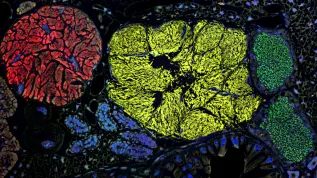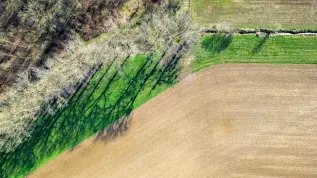
Scientists are trying to better understand the impact of the Baltic Sea on the Arctic. Analysis of samples collected during the annual AREX scientific expedition by the Institute of Oceanology at the Polish Academy of Sciences will make it possible to investigate whether and how the brackish waters of the Baltic Sea affect the Arctic environment.
Daniel Rak from the Observational Oceanography Laboratory at the Institute of Oceanology PAS and member of the R/V Oceania research team, says that the first stage of the AREX 2024 cruise, which ended on June 20, was 'symbolically laying the cornerstone for research on the interactions between the Baltic Sea and the Arctic'. This stage included comprehensive hydrological and atmospheric studies on the route from the Baltic Sea to the Norwegian Sea.
'During the first stage of the AREX 2024 cruise, interdisciplinary studies were conducted to understand the physical and chemical properties of brackish water masses flowing from the Baltic Sea to the Arctic. As part of this research, a number of measurements were taken, covering environmental conditions such as temperature, salinity, oxygenation and concentration of nutrients', says Rak.
In addition, the scientists conducted measurements of water turbulence and analysed the qualitative and quantitative composition of microplankton and mesozooplankton clusters. They also examined the content of selected chemical pollutants, such as mercury, phenols and microplastics.
Another part of the research were continuous meteorological measurements with simultaneous measurements of atmospheric physics, including primarily sea aerosol, and physical and chemical analyses of the surface microlayer.
Rak says that the work related to the cruise does not end on board the ship. 'In the longer term, hydrodynamic modelling of the outflow of surface waters and satellite observations of suspended matter and chlorophyll are planned. Thanks to these activities, we will obtain a comprehensive image of the conditions prevailing on the path of the Baltic water flow to the Arctic', he says.
According to the researcher, the samples collected during this stage are crucial for understanding the complex relationships between the Baltic and the Arctic. He explains that 'the analysis of the samples will make it possible to investigate whether and how the brackish waters of the Baltic Sea affect the Arctic environment. Since they are less salty than Arctic waters, they affect the circulation and freezing of waters in the coastal areas of the Barents Sea. They also carry pollutants, nutrients and planktonic organisms. Hydrodynamic measurements and modelling will allow to determine the exact route of these waters and their mixing’.
Identification and analysis of chemical pollutants such as mercury and microplastics will help assess their impact on marine ecosystems. 'Studies of the structure and distribution of plankton will provide valuable information on the biodiversity and condition of the marine ecosystem', Rak continues.
The scientist admits that during the research, changing weather at sea made some measurements difficult. 'Working on a ship can be physically demanding, regardless of weather conditions, both during calm weather and storms', he says.
Another challenge was the need to coordinate the activities of two research vessels: R/V Oceania and R/V Oceanograf, owned by the University of Gdańsk, because this year, the first stage of AREX was carried out for the first time in cooperation with the University of Gdańsk. 'While R/V Oceanograf conducted research in coastal and fjord zones, R/V Oceania conducted research on the continental slope', Rak says. Despite the inconveniences, most of the planned research was carried out.
‘The most valuable element of this expedition was the opportunity to conduct interdisciplinary measurements, which us allowed to obtain comprehensive information on conditions in various scientific fields. Thanks to the cooperation of several research groups and a wide range of methods, it was possible to conduct detailed environmental and biological analyses', he says.
The research expedition is not only oceanographic activities, but also a chance to promote science. 'In Bodø, Norway, where we strengthened relations with our Polish-Norwegian partners, we proudly presented the Polish vessels R/V Oceania and R/V Oceanograf, which hosted the +Woman View of the Sea+ exhibition', Rak says.
AREX (ARctic EXpedition) is an annual scientific expedition organized by the Institute of Oceanology of the Polish Academy of Sciences. The cruises are conducted on board the research vessel R/V Oceania. The aim of AREX is to conduct interdisciplinary research in the European Arctic: in the Nordic Seas (Norwegian Sea and Greenland Sea), the Barents Sea, the Fram Strait, the Arctic Ocean and the fjords of Spitsbergen. The research covers a wide range of scientific fields, including physical, chemical, biological oceanography and climate research. AREX expeditions provide valuable data on the variability of the Arctic environment, which is crucial for monitoring climate change and modelling the processes that occur in the Arctic Ocean.
PAP - Science in Poland
amk/ agt/ kap/
tr. RL













